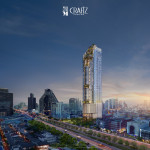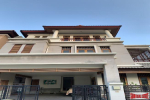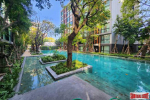2014/07/09 in Latest news - 30
American Billionaire Made in Thailand Keeping Kingdom Bet
From his Bangkok penthouse, billionaire Bill Heinecke has witnessed the turmoil roiling his adopted country of Thailand. His money is on the kingdom surviving the tumult, including a coup in May. "I'm not going anywhere," he says. Photographer: Ian Teh/Bloomberg Markets
American Billionaire Made in Thailand Keeping Kingdom Bet
Ensconced in his lavishly appointed penthouse 45 stories above the teeming streets of Bangkok, U.S.- born billionaire Bill Heinecke perceives firsthand the rewards and perils of a lifetime betting on turbulent Thailand.
When he opened the St. Regis hotel and residences in 2011, he reserved the two highest floors for himself, installing a spa, a wine cellar, a marble staircase and memorabilia that includes a costume worn by Yul Brynner in the Broadway musical The King and I.
Even this personal haven can’t fully cocoon Heinecke, 65, from the realities of Thai life, Bloomberg Markets magazine will report in its July-August issue.
On good days, he can see forever across a city of golden Buddhist stupas and glistening glass office towers that for decades has excited tourists and investors alike. On bad days, he’s had the unsettling view of deadly street protests that Thailand’s political and military leaders warned could have plunged Southeast Asia’s second-biggest economy into civil war.
On May 22, the stakes rose higher when the military seized power from what was left of the elected government of Prime Minister Yingluck Shinawatra, who was ousted from office by the country’s Constitutional Court two weeks earlier.
While a ban on public gatherings and detention of pro-democracy activists at least temporarily put the lid on street protests, the coup slammed a tourism-dependent economy that had already shrunk 0.6 percent in the first quarter.
Ruling Junta
Internationally, the U.S. scrapped joint military programs with Thailand, accusing the ruling junta of detaining and intimidating hundreds of political figures, academics and peaceful protesters.
The European Union said it’s suspending official visits to and from the country. And exiled Thai dissidents formed a resistance movement, adopting a name that echoes that of Thailand’s wartime anti-Japanese underground, the Seri Thai.
Amid the turmoil, the combative Heinecke continued to do what he does best: make money.
During five decades in Thailand -- he surrendered his U.S. passport for Thai citizenship in 1991 -- he’s created a multinational hotel, restaurant and retail empire that has survived five previous military takeovers, the 1997-to-1998 Asian financial crisis, a deadly 2004 tsunami that swept away one of his resorts and bruising corporate skirmishes with foes as powerful as Goldman Sachs Group Inc. (GS:US)
‘Rebooting the System’
Heinecke’s taking his sixth coup in stride. “It’s like a rebooting of the system,” he says in a telephone interview from his penthouse two weeks after the junta took power.
“The government had come to a standstill. There would have been continued political conflict if the military hadn’t stepped in. Democracy will eventually be returned to the people, as has always happened in the past.”
Indeed, he still sees any coup-induced ructions in Thai markets as buying opportunities, as he’d suggested during an interview before the takeover in his cluttered office some 5 kilometers (3 miles) from his penthouse: “The best time to move in is when others are moving out. All this talk of civil war is nonsense.”
Besides the St. Regis, Heinecke’s 108 hotels include four Four Seasons, two Marriotts and 30 luxury properties he operates under his own Anantara brand.
Among his 1,850 fast food and retail businesses are Thailand’s biggest pizza chain and franchises for Burger King, Dairy Queen, Esprit, Gap and Swensen’s.
Private Jets
These holdings and others come under Heinecke’s Bangkok-listed Minor International Pcl. (MINT) Last year, Minor’s market value for the first time topped $3 billion, making Heinecke, who owns 33 percent of the company, a billionaire -- and that’s without counting closely held investments, such as MJets, Thailand’s largest operator of private jets.
Since bottoming during the Asian financial crisis in January 1998, Minor stock has soared 50-fold -- more than 10 times the return of the SET Index, according to data compiled by Bloomberg. This year as of July 8, it has risen 49 percent compared with a 16 percent gain in the benchmark gauge.
A prime beneficiary of Minor’s surge is Thailand’s King Bhumibol Adulyadej, who owns 2 percent of the company in his own name. Another 4 percent is held by other royal family members and the Crown Property Bureau, the monarchy’s money manager -- putting the value of the royal holdings at $227 million.
Record Profits
Anil Thadani, founder of Symphony International Holdings Ltd. (SIHL), a London-listed investment company that owns Minor shares, says he admires Heinecke’s tenacity and drive.
“Out of approximately 80 investments I have made over 30 years, Bill would be one of the two best,” Thadani says. “He doesn’t like to lose at anything -- small or big -- and he does whatever it will take to succeed. I have seen him pull through one crisis after another.”
In the latest example of that, Minor reported record profits twice in four months. That happened even as some foreign governments issued public warnings about the hazards of traveling to Thailand -- warnings that Heinecke says are more damaging to the Thai economy than the coup is.
In February, Minor announced that net income for all of 2013 rose 26 percent to an unprecedented 4.01 billion baht ($124 million).
Then on May 9, the company reported that profit for the first quarter of 2014 increased 1 percent to 1.42 billion baht, an all-time high, despite occupancy rates at his two grandest hotels, the St. Regis and the Four Seasons in Bangkok, that Heinecke says plunged to as low as 25 percent.
Adopted Homeland
Heinecke achieved these crisis-defying returns through a twofold strategy. Overseas, he’s aggressively expanding his international business to become less dependent on his adopted homeland.
In 2008, Minor earned only 13 percent of its revenue outside Thailand. By last year, that figure had jumped to 29 percent. Today, Heinecke’s hotels and restaurants span 26 countries as diverse as Australia, China, Dubai, the Maldives, Mozambique, Myanmar and the United Arab Emirates.
By 2018, he says, he wants 45 percent of sales to originate beyond Thailand’s borders.
At home, Heinecke is continuing to expand his Thai operations -- albeit away from the political turmoil that has roiled Bangkok.
Color-Coded Divide
One focus: the resort island of Phuket, 700 kilometers south of the capital, where he has three Anantaras and a Marriott. Betting Thailand will continue to attract the international superrich, he’s offering palatial holiday homes he plans to sell for more than $10 million each on a hillside overlooking the Anantara Phuket Layan Resort and Spa.
“This is a very severe crisis,” Heinecke says, “but at the end of the day, the Thais will pull together as they always have.”
To achieve that unity, Thailand’s feuding factions will have to bridge a daunting color-coded political and societal divide. On one side are the so-called Yellow Shirts -- protesters largely backed by the Bangkok urban elite and the Democrat Party, which hasn’t won an election in 20 years and before the coup campaigned for a suspension of democracy and appointment of an unelected governing council.
On the other side are the Red Shirts, backed by many of the rural poor majority that in 2011 voted Yingluck’s Pheu Thai Party into power. Yingluck, 47, is the sister of tycoon Thaksin Shinawatra, himself an elected leader overthrown in a 2006 military coup.
Royal Succession
Since then, Bangkok repeatedly has been thrown into turmoil. In 2008, Yellow Shirts shut down the capital’s airports for a week, stranding 400,000 travelers. In 2010, 92 people died when Red Shirts occupying the city center were driven out by the military.
In the most-recent demonstrations, which began on Oct. 31, 28 people had been killed as of July 8.
An impending royal succession has further clouded the country’s future. King Bhumibol, 86, is the world’s longest-reigning monarch, having ascended the lotus throne in 1946.
Outlasting military dictators and revolving-door civilian governments, King Bhumibol has been the country’s one enduring presence. Now, he’s ailing and seldom seen in public. His heir, Crown Prince Maha Vajiralongkorn, who turns 62 on July 28, enjoys less affection.
Good Omen
Heinecke declines to discuss politics other than to say his own experience suggests the divisions in Thai society can be healed. Heinecke’s empire spans the far north of Thailand, which is a Red Shirt stronghold, and the far south, where Yellow Shirts hold sway.
“We are a company of at least 20,000 people, and we probably have 10,000 on each side, and they certainly have no difficulty working together,” he says.
Heinecke, whose wife of 46 years, Kathy, also took Thai citizenship, cites his acceptance by Thais as a good omen. The bearded, 1.8-meter-tall (6-foot-tall) Heinecke, who towers over most Thais, could have been spurned as an outsider.
He speaks barely 100 words of their language, according to investor Thadani. By his own admission, his shouting and occasional displays of anger are un-Thai-like.
“I wear my feelings on my sleeve,” Heinecke says. “But I won’t carry a grudge, and I think this is somewhat a Thai tradition, too. That’s why I am optimistic for a rapid recovery, because grudges are forgotten very quickly. Today’s enemies are tomorrow’s friends.”
‘Trusting Relationship’
Perhaps no foreign-born investor has made a bigger personal bet on Thailand than Heinecke. As a U.S. diplomat’s son studying at the International School Bangkok in 1967, he resisted parental pressure to return home to enroll at Washington’s Georgetown University.
Instead, at age 17, he borrowed $1,200 and set up an office-cleaning company. By the time he became a Thai citizen, Heinecke had forged business ties with the royal family’s asset managers by leasing crown land on which he built hotels.
“Bill struck me as a go-getter but also as an honest person,” says Usni Prnamoj, who heads the office that manages the king’s private property and who signed the first such deal in 1976.
“It was the start of a long and trusting relationship,” Heinecke wrote in The Entrepreneur (Wiley, 2003).
‘Sacred Asset’
Just how trusting became clear in 1999, when another of the monarchy’s money managers, the Crown Property Bureau, helped Heinecke thwart Goldman Sachs’s $46 million hostile takeover of Rajadamri Hotel Pcl, owner of the Bangkok property then known as the Regent and since renamed the Four Seasons.
The hotel stands on land owned by the royal family, and Heinecke, who controlled 25 percent of Rajadamri’s shares, rallied the property bureau and other stockholders to his side. Goldman finally ended up with only a 41 percent stake and, in 2003, sold out to Heinecke for $19 million.
“Goldman’s offer was higher than Bill’s, but Bill’s PR machine was better,” Thadani says. “He persuaded other shareholders the hotel was a sacred Thai asset that mustn’t fall into foreign hands.” Edward Naylor, Goldman’s Hong Kong–based spokesman, declined to comment.
For Heinecke, that victory marked a sharp rebound from events of less than two years earlier when the collapse of the baht had unleashed the 1997-to-1998 Asian financial crisis.
‘Worth Nothing’
As the baht plunged to 55 to the U.S. dollar from 25 six months earlier, hundreds of companies that had borrowed in dollars collapsed. Heinecke says Minor was almost one of them.
“I was worth $100 million in 1996,” he wrote in his book. “Soon after the crash, I was worth nothing.”
He says he survived by acting faster than others. The auto-racing fanatic sold all his overseas assets, right down to a Corvette and a Jaguar E-Type, repatriating the funds to Thailand to prop up his business. By the end of 1998, he was back in the black.
Soon, Heinecke was once again fighting a global giant when he took on what was then the world’s second-biggest fast-food-chain operator: Louisville, Kentucky–based Tricon Global Restaurants Inc.
In 1981, Heinecke had won the rights to Tricon’s Pizza Hut franchise in Thailand. When it came up for renewal in 1999, Tricon -- since renamed Yum! Brands Inc. (YUM:US) -- sought an increase in royalties and a clause banning Heinecke from operating other franchises.
Heinecke resisted and set up his own brand, The Pizza Company, in competition. Today, it has some 190 stores in Thailand compared with 79 for Pizza Hut.
‘Aggressively Expanding’
Without commenting on the set-to with Heinecke, Scott Bergren, Pizza Hut’s Plano, Texas–based chief executive officer, said in an e-mail, “We are aggressively expanding the Pizza Hut brand in Thailand.”
Heinecke has succeeded in large part because of the loyalty he engenders in Thai staff, says Chompan Kulnides, a former A.T. Kearney Inc. and Accenture Plc management consultant who’s now investment director of Heinecke’s family office.
“Other foreign bosses I worked for all said they loved Thailand, and some had even married Thais, but they always treated their Thai employees differently,” Chompan, 38, says. “They referred to us as ‘the Thais.’ He refers to all of us as ‘the team.’ There’s never the slightest segregation. That’s why I want to work for him forever.”
Elephant Polo
Chompan says that for all his perceived toughness, Heinecke has further endeared himself to Thais by spending money where he earns it -- supporting causes ranging from children in Bangkok’s Klong Toey slum to elephants that fell on hard times after they and their mahouts were left jobless when logging was banned in Thailand’s forests.
Each year, Heinecke stages a charity elephant polo tournament that has become a hit on the social calendar. He also runs an elephant sanctuary adjacent to his Four Seasons and Anantara resorts in Thailand’s Golden Triangle.
What’s important to investors is Heinecke’s ability to do business successfully in Thailand in a manner acceptable to foreign shareholders, says Joel Silverstein, president of Hong Kong–based East West Hospitality Group, a consulting firm. “It is very rare indeed to find a Western entrepreneur in an emerging market succeed to such an extent while still adhering for the most part to Western business practices,” Silverstein says.
Reflecting on past battles, Heinecke says his tussles with Goldman and Tricon were unavoidable. “Sometimes, you are backed into a corner and have to fight your way out,” he says. Today, amid Thailand’s turmoil, Heinecke says he’s again going to stand his ground. “It’s my home,” he says. “I’m not going anywhere.”
Source:
To contact the reporter on this story: William Mellor in Sydney at [email protected]
To contact the editors responsible for this story: Stryker McGuire at [email protected] Jonathan Neumann





